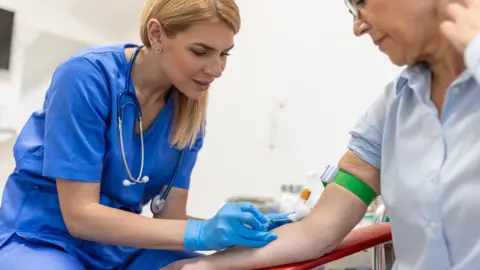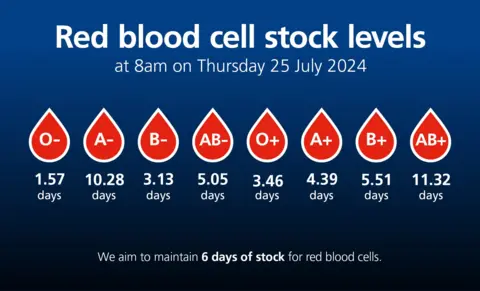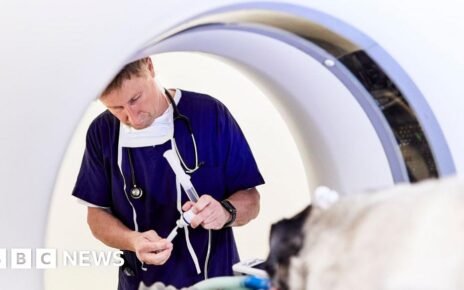 Getty Images
Getty ImagesThe NHS is appealing for people with O-type blood to urgently come forward and donate, after blood stocks dropped to “unprecedently low” levels in England.
Officials said it follows a “perfect storm” of unfilled appointments at donor centres and increased demand following a cyber-attack which has affected services in London.
O-negative blood – known as the universal blood type – is safe for all patients. It is used in emergencies or when a patient’s blood type is unknown.
Officials have also issued an amber alert asking hospitals to restrict use of O-type blood to essential cases or use an alternative where safe to do so.
 NHS Blood and Transplant
NHS Blood and TransplantThe chief executive of NHS Blood and Transplant , Dr Jo Farrar, said the service had an “incredible response” from donors after an earlier appeal last month.
“However, seven weeks on, the need for O-negative blood in particular remains critical,” she said.
The latest data shows that national stocks of O-negative blood are currently running at only 1.6 days in England, well below the six-day target.
The shortage is blamed in part on a ransomware attack on the pathology firm Synnovis last month.
Before a patient can be given a blood transfusion, hospitals routinely check their blood type to make sure the donated blood is compatible.
Since the cyber-attack in June, a number of major London hospitals that contracted with Synnovis, including King’s and Guy’s and St Thomas’, have not been able to run those checks as quickly as normal.
Instead doctors have been forced to use universal O-type blood, which is draining stock levels across the whole system in England.
Summer demand spikes
At the same time, the number of people regularly giving blood tends to reduce in the summer, because more donors travel abroad on holiday.
Hot weather can also see an increase in people unable to donate because of a lack of hydration, or lower iron levels in their blood.
NHS Blood and Transplant is asking both O-negative and O-positive donors to urgently book an appointment at a donor centre.
It has also issued an amber alert for only the second time in its history.
That triggers contingency plans asking hospitals to restrict the use of O-type blood to essential cases, and allowing services to move staff to laboratories to carry out checks more quickly.
It says hospitals will still be able continue to perform urgent, emergency or trauma surgery, cancer surgery, transplant surgery and blood transfusions to treat people with long-term conditions.
What is O-type blood?
There are four main blood groups – A, B, AB and O – but some are rarer than others.
Each contains different antigens and antibodies, meaning that receiving blood from the wrong group can be life-threatening.
About 40% of the population have the most common type, O-positive, which can be given to any male and all females over childbearing age.
Another 8% have O-negative blood, often called the universal blood type, which can be safely transfused into any patient, because it will not trigger an immune response.
All air ambulances and emergency response vehicles, for example, routinely carry O-negative supplies.




